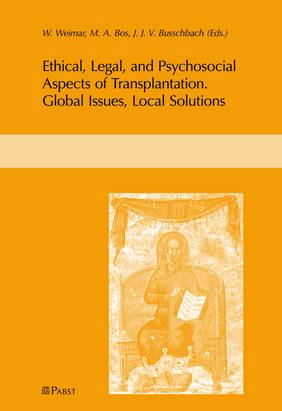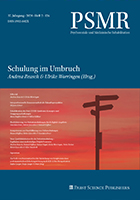This book is based on the International Congress Ethical, Legal, and Psychosocial Aspects of Transplantation. Global Issues, Local Solutions (Rotterdam, The Netherlands, April 2013).
The contributions are an overview of current issues in the field of transplantation ethics.
The topics:
- Cultural and Religious Aspects of Living and Deceased Donation;
- Cross-Border Transplants;
- Psychosocial Care;
- Autonomy at the End of Life;
- Public Issues;
- Children as Donors and Recipients;
are discussed among ethicists, clinicians, psychologists, lawyers and policy makers in the field of organ transplantation.
The ELPAT platform was initiated with the aim to establish continuity in European communication on Ethical, Legal and Psychosocial Aspects of Organ Transplantation (ELPAT), after several ad hoc conferences had been organised in the last two decades. ELPAT aims to facilitate and structure the European research area in this field of science. It is now an official section within the European Society for Organ Transplantation (www.ELPAT.org).
Contents:
1. Preface
W. Weimar
2. Global Issues, Local Solutions/Global Outreach
Personal rights and the acquisition of organs
Timothy M. Wilkinson
Organ donation and transplantation in emerging economies
S. A. Anwar Naqvi, Mirza Naqi Zafar & S. Adibul Hasan Rizvi
The Declaration of Istanbul on organ trafficking and transplant tourism: the first five years
Gabriel M. Danovitch
3. Cross-Border Transplants
Success factors to decrease foreign transplants in Colombia, South America
Néstor F. Pedraza, Fernando Girón, Alejandro Nino, Jorge E. Rodriguez, Yenny A. Baez
International norms, local worlds: An ethnographic perspective on organ trafficking in the Israeli context
Zvika Orr
The new crime of human organ trafficking in Spain. An approach to comparative law
Clara Moya Guillem
4. Increasing Living Donation
Improving cooperation between forensic pathologists and transplant teams in Belarus: A strategy for increasing transplant organs supply
Andrei Famenka
Improving communication and consent for organ donation among minority ethnic groups: Development and evaluation of a hospital based intervention
Myfanwy Morgan, Charlotte Kenten, Jessica Sims, Tim Newton
Nudges for organ donation. How do they work?
Ana Manzano
Inter-institutional collaboration in order to reduce the opposition rate to organ donation in the population
Simonetta Nieri, Paolo Maria Geraci, Massimo Abelli, Maurizio Campagnoli, Gianni Lodi, Carla Martinotti, Federica Meloni, Carlo Pellegrini, Elena Ticozzelli, Guido Fontana
Consensus - a threat to public engagement
Anne Hambro Alnæs
5. Increasing Deceased Donation
Will the GABOiR data registry help to improve the health and risk stratification in ABO-incompatible living kidney transplantation?
Silvia Hils, Marcel Geyer, Albrecht Kramer-Zucker, Przemyslaw Pisarski
Increase kidney transplantation. The Irish organ donors, mandatory consent choices era
Arwa Nicola Shuhaiber
Transplant professionals views on the ethical challenges associated with altruistic unbalanced paired kidney exchange
Céline Durand, Andrée Duplantie, Marie-Chantal Fortin
Maximizing 0pportunies for living kidney donation
Robert Lam, Linda Wright, Michael Campbell, Olusegun Famure, S. Joseph Kim
Attitudes towards living organ donation in two Romanian universities
Harald Jung, Mihaela Frunză
Living organ donation in Europe: Barriers and opportunities through the stakeholders eyes. Results from focus groups in four European countries
Assya Pascalev, Yordanka Krastev, Adelina Ilieva
Ethical challenges in living organ donation
Assya Pascalev, Yordanka Krastev, Adelina Ilieva
Legal issues in living organ donation in the member states of the EU
Leonie L. Lopp
Reflections on the Israeli legislation on transplantation
David M. Wood & David A. Frenkel
6. Children as Donors and Recipients
The pediatric priority in organ allocation is not necessary and is counterproductive - proposal for an alternative ethical model
Jean-Luc Wolff, Michel Carrier, Melanie Masse & Natacha Philippe
Gift dynamics and identity construction within the family
Karl-Leo Schwering, Isabelle Aujoulat
7. Psychosocial Care
Health literacy and self-management among kidney transplant patients
Louise Maasdam, Emma K. Massey, Marleen C. de Haan-van Buren, Mirjam Tielen, Judith Kal-van Gestel, Michiel G. H. Betjes, Willem Weimar
Pancreatic transplantation in patients with T1DM: a source of traumatic stress?
Sue Jackson, Kate Gleeson, R. M. Smith
Compliance to treatment and family support in kidney-pancreas transplantation recipients
Susana M. Bayardo, Silvia R. Groppa, Sung Ho Hyon
Psychosocial benefits of upper limb transplantation
Adam Chełmoński, Katarzyna Kowal, Jerzy Jabłecki
How can the past experience of donors and recipients inform the psychosocial screening of candidates for living kidney transplantation?
Deborah Ummel & Marie Achille
Who has extreme expectations of donation? Exploring the psychological profile of living kidney donors
Lotte Timmerman, Mirjam Laging, Willij C. Zuidema, Jan N. M. IJzermans, Michiel G. H. Betjes, Jan J. V. Busschbach, Willem Weimar, Emma K. Massey
Telemedically supported aftercare in living kidney recipients - an innovative project at the transplantation center Freiburg Design and first results of a prospective ongoing study
Silvia Hils, Anja Schmid, Dieter Hauschke, Lioudmila Bogatyreva, Przemyslaw Pisarski
Donors and recipients of living donor liver transplantation: How can a metasummary of their experience inform the psychosocial screening?
Deborah Ummel & Marie Achille
8. Autonomy at the End of Life
Exploring organ donation with bereaved relatives, healthcare professionals experiences in three European countries
Barbara Louise Neades
Non-standard kidneys for transplant: Clinical margins, medical morality, and the law
Antonia J. Cronin & James F. Douglas
Rethinking the role of consent in relation to post mortem organ transplantation
Austen AP Garwood-Gowers & Janine Moreton
Non-standard resuscitation in refractory cardiac arrest: saving patients lives, first and, when not possible, preserving organs
Iván Ortega-Deballon & E. de la Plaza-Horche
Organ donation after euthanasia: views of professional community in Slovenia
Jana imenc, Danica Avsec
DCDD: What are we waiting for?
Alicia Pérez Blanco & Pablo de Lora
9. Donor Recruitment, Altruism and Compensation
Should postmortal donation be motivated by altruism?
Govert den Hartogh
A regulated system of incentives for living donation: a challenge to define and understand the objections
Arthur J. Matas
10. Anonymity
Ethics and the requirement of anonymity in organ donation: An uneasy and unsettled bond
Medard T. Hilhorst
Contact between living anonymous donors and recipients: ethical issues
Linda Wright & Kyle W. Anstey
11. Hot Topics in Allocation
Is it possible to transplant restored kidneys?
Miyako Takagi
2014, 340 pages, ISBN 978-3-89967-931-1, price: 35,-























